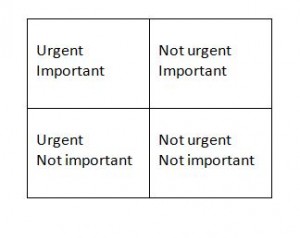 Can you really “manage time?” So many books, presentations and training sessions are devoted to “time management” that one would think it’s something you can manage. However, time is a constant, it never changes. There are 24 hours in a day, 7 days in a week, 365 days in a year, and as far as I can tell, no one has been successful in managing to change the amount of time in a day. Time really gets a bad rap for being unmanageable and so unruly when all it has ever done is remain constant.
Can you really “manage time?” So many books, presentations and training sessions are devoted to “time management” that one would think it’s something you can manage. However, time is a constant, it never changes. There are 24 hours in a day, 7 days in a week, 365 days in a year, and as far as I can tell, no one has been successful in managing to change the amount of time in a day. Time really gets a bad rap for being unmanageable and so unruly when all it has ever done is remain constant.
If we give up the premise that we can “manage” our time, what is the real problem? The problem is we don’t have enough of it – or perceive we don’t have enough of it. However, if we accept that time is constant, it’s really about our choices inside of that time that make a difference – not the time itself.
Let’s call it what it should be called – “choice management.” If it is choice management, it’s something we control. If it’s time management, no one controls it and therefore we can feel powerless or use it as an excuse when we don’t meet a deadline. “Oh, if only I had had more time, I could have finished it.” Sound familiar? I know I’ve said it!
If it’s a choice, and you have a defined period with which to get something done, YOU choose how to spend the time accomplishing the task. If there is simply not enough time, given the scope of the task, you have multiple choices:
• Get help
• Extend the deadline
• Do as much as you can
• Ignore the deadline
• Find a creative or different way to accomplish it sooner
• Do nothing
• Many more…
Dan Baker’s book, “What Happy People Know,” suggests that people are happier when they believe they have a choice. Those who believe they have no choice are unhappier. The key word here is “believe.” If we believe we have a choice about how we spend our time, would that lead to more happiness? More resourcefulness? More completed deadlines? Probably.
Look at what you have to accomplish and start making choices about how you spend your time. Steven Covey uses 4 quadrants to define the types of tasks we have to accomplish as:
 His point is we should be spending our time on the “not urgent/important,” (upper right quadrant), items to make us more effective. I would say it will also make you happier because you are choosing how to spend your time and probably being more effective at it.
His point is we should be spending our time on the “not urgent/important,” (upper right quadrant), items to make us more effective. I would say it will also make you happier because you are choosing how to spend your time and probably being more effective at it.
Take a look at what you have to accomplish in the day, week or month ahead. What choices do you have to make? How can you spend your time on the not urgent but important items? (Hint – they become urgent when you don’t deal with them NOW.) If you view your time as a constant, and make better choices within that time, you’ll be more effective and happier.
Throw out all your notions about mastering the illusory “time management” and welcome to choice management!
